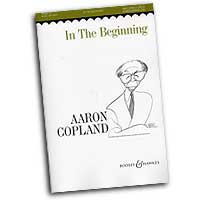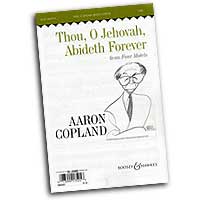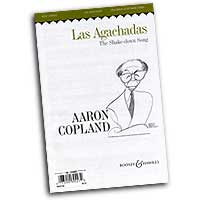
Aaron Copland



Aaron Copland was the pioneer of American music -- he showed the world how to write classical music in an American way. He was born in 1900, when Americans were rarely recognised as composers in the music world. So Copland went to Europe for serious study, and, in the 1920s, wrote pieces with the flavour of jazz. European classical composers were also influenced by jazz at this time, as they were searching for new ways to bring their music into the 20th century.
Copland's early works Grohg and Music for the Theatre show jazz influence. But he was soon to shed this in favour of strictly classical yet modernist works. With the great depression of the 1930s, when millions of Americans were unable to find work, the appeal of abstract music began to wain. So beginning in 1938, Copand produced a series of ballets that were to be widely heard and musically influential: Billy the Kid (a ballet about a legendary western outlaw, complete with cowboy songs, commissioned in 1938 by Kirstein for Eugene Loring), Rodeo (another Wild West ballet, about a cowgirl's search for a man) and Appalachian Spring (commissioned by the choreographer Martha Graham). When World War II began, the Cincinnati Symphony needed a patriotic American hero, and Copland -- by now one of the most famous composers in America -- wrote A Lincoln Portrait. For the same orchestra, he created his noble Fanfare for the Common Man.
Copland is probably best known for his concert and ballet works, but his eight scores for films -- documentaries and versions of plays by Wilder, Steinbeck and others -- set new standards for Hollywood. Purists may have criticised such "popular" works, but Copland's fine classical ear gave even cowboy songs both extra bite and depth. His work provides the musical backdrop for director Spike Lee's new film for Touchstone Pictures -- He Got Game, and it is featured on Sony Classical's original motion picture soundtrack recording from the film (SK 60593), the majority of which is conducted by the composer himself.
 |
|
With text from Genesis this is a very interesting and rewarding extended work for mixed chorus a cappella and features a solo for Mezzo-Soprano.
| 9160 SONGBOOK $14.50 |
 |
|
These four motets were composed in the fall of 1921 while Copland was studying with Nadia Boulanger in Paris. The four motets have remained unpublished until now. Writing to Copland about them in 1924, Boulanger tells the composer that "those motets sound in the voices in a stunning manner."
| 9164 SONGBOOK $14.50 |
 |
Based on melody No. 202 in Kurt Schindler's collection: "Folk Music and Poetry of Spain and Portugal." The chorus is to be divided into two groups: The main choral body, and a conrasting smaller "Solo group" of approximately 3 or 4 voices to a part.
| 9165 SONGBOOK $5.95 |
![]() Choral - Home | Mens Choral | Womens Choral | Mixed Choirs | Early Music
Choral - Home | Mens Choral | Womens Choral | Mixed Choirs | Early Music
Childrens Choir | Boys Choirs | Girls Choirs | Choral arrangements | Choral Christmas | Director's resources
African | English | Canadian | Bulgarian | Estonian | Hungarian | Scandinavian | Russian | Latin American
Spirituals | Madrigals | Budget Choral titles | DVDs | Complete choral list
![]() RSS Feed - Choral New Releases
RSS Feed - Choral New Releases
Vocal Jazz | Doo Wop | Contemporary | Barbershop | Christian | Collegiate | World | Choral
Patriotic | The Groups | The Directors | The Vocal Coaches | Choral Development
Arrangements | Vintage Harmony | Christmas | DVDs | Instructional for Singers
The Harmony Sweepstakes A Cappella Festival
![]() RSS - New Releases
RSS - New Releases
Site Map | A Cappella News | Regional Newsgroups | RSS a cappella feeds
To find a specific song on any recording (or to find recordings by group name or CD title),
pick the search method and type the item you are searching for here:

All Rights Reserved All Content, page design, CGI Copyright © United Singers International